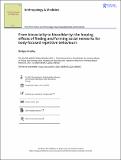From biosociality to biosolidarity : the looping effects of finding and forming social networks for body-focused repetitive behaviours
Abstract
Anthropological accounts of biosociality reveal the importance of the social relations formed through shared biomedical conditions. In the context of body-focused repetitive behaviours (BFRBs), like compulsive hair pulling (trichotillomania) and skin picking (dermatillomania), biosociality moves people from isolation towards community. After diagnosis, the powerful moment of discovering ‘you are not alone’ can lead to immense personal transformations, demonstrating the ‘looping effects’ of diagnosis and biosociality. Yet, biosocial groups do not simply exist, and must first be formed and found and their sustainability requires ongoing work and care from biosocial actors themselves. Biosociality also means different things to different people, often requiring a negotiation between secrecy and disclosure. This article acknowledges the role of stigma in biosociality, differentiating between private and public biosocial experiences. It argues that through biosociality come acts of biosolidarity, where advocacy can improve the visibility and recognition of illness groups. The circular looping effects of biosociality and biosolidarity demonstrate the way that community activism and biosociality reproduce one another. Through reflections from the anthropologist, biosolidarity is considered as a methodological tool that can help scholars to navigate the boundaries between relatedness, sociality and advocacy in the field and beyond.
Citation
Bradley , B 2021 , ' From biosociality to biosolidarity : the looping effects of finding and forming social networks for body-focused repetitive behaviours ' , Anthropology & Medicine , vol. Latest articles . https://doi.org/10.1080/13648470.2020.1864807
Publication
Anthropology & Medicine
Status
Peer reviewed
ISSN
1364-8470Type
Journal article
Description
The research fieldwork was supported by the University of Edinburgh’s School of Social and Political Science Graduate School Scholarship 2015-2017. A grant from the Scottish Funding Council (SFC/AN/08/020) made it possible to complete this manuscript during a pandemic, and also allowed the article to be provided Open Access.Collections
Items in the St Andrews Research Repository are protected by copyright, with all rights reserved, unless otherwise indicated.

